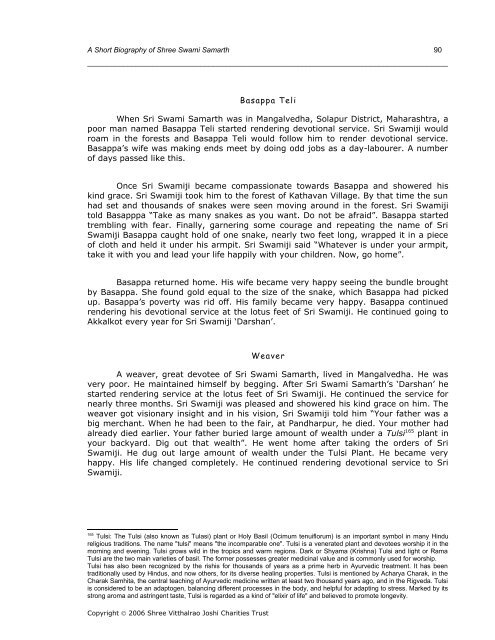Shree Swami Samarth Maharaj
Shree Swami Samarth Maharaj
Shree Swami Samarth Maharaj
You also want an ePaper? Increase the reach of your titles
YUMPU automatically turns print PDFs into web optimized ePapers that Google loves.
A Short Biography of <strong>Shree</strong> <strong>Swami</strong> <strong>Samarth</strong> 90<br />
_________________________________________________________________________________________<br />
Basappa Teli<br />
When Sri <strong>Swami</strong> <strong>Samarth</strong> was in Mangalvedha, Solapur District, Maharashtra, a<br />
poor man named Basappa Teli started rendering devotional service. Sri <strong>Swami</strong>ji would<br />
roam in the forests and Basappa Teli would follow him to render devotional service.<br />
Basappa’s wife was making ends meet by doing odd jobs as a day-labourer. A number<br />
of days passed like this.<br />
Once Sri <strong>Swami</strong>ji became compassionate towards Basappa and showered his<br />
kind grace. Sri <strong>Swami</strong>ji took him to the forest of Kathavan Village. By that time the sun<br />
had set and thousands of snakes were seen moving around in the forest. Sri <strong>Swami</strong>ji<br />
told Basapppa “Take as many snakes as you want. Do not be afraid”. Basappa started<br />
trembling with fear. Finally, garnering some courage and repeating the name of Sri<br />
<strong>Swami</strong>ji Basappa caught hold of one snake, nearly two feet long, wrapped it in a piece<br />
of cloth and held it under his armpit. Sri <strong>Swami</strong>ji said “Whatever is under your armpit,<br />
take it with you and lead your life happily with your children. Now, go home”.<br />
Basappa returned home. His wife became very happy seeing the bundle brought<br />
by Basappa. She found gold equal to the size of the snake, which Basappa had picked<br />
up. Basappa’s poverty was rid off. His family became very happy. Basappa continued<br />
rendering his devotional service at the lotus feet of Sri <strong>Swami</strong>ji. He continued going to<br />
Akkalkot every year for Sri <strong>Swami</strong>ji ‘Darshan’.<br />
Weaver<br />
A weaver, great devotee of Sri <strong>Swami</strong> <strong>Samarth</strong>, lived in Mangalvedha. He was<br />
very poor. He maintained himself by begging. After Sri <strong>Swami</strong> <strong>Samarth</strong>’s ‘Darshan’ he<br />
started rendering service at the lotus feet of Sri <strong>Swami</strong>ji. He continued the service for<br />
nearly three months. Sri <strong>Swami</strong>ji was pleased and showered his kind grace on him. The<br />
weaver got visionary insight and in his vision, Sri <strong>Swami</strong>ji told him “Your father was a<br />
big merchant. When he had been to the fair, at Pandharpur, he died. Your mother had<br />
already died earlier. Your father buried large amount of wealth under a Tulsi 165 plant in<br />
your backyard. Dig out that wealth”. He went home after taking the orders of Sri<br />
<strong>Swami</strong>ji. He dug out large amount of wealth under the Tulsi Plant. He became very<br />
happy. His life changed completely. He continued rendering devotional service to Sri<br />
<strong>Swami</strong>ji.<br />
165 Tulsi: The Tulsi (also known as Tulasi) plant or Holy Basil (Ocimum tenuiflorum) is an important symbol in many Hindu<br />
religious traditions. The name "tulsi" means "the incomparable one". Tulsi is a venerated plant and devotees worship it in the<br />
morning and evening. Tulsi grows wild in the tropics and warm regions. Dark or Shyama (Krishna) Tulsi and light or Rama<br />
Tulsi are the two main varieties of basil. The former possesses greater medicinal value and is commonly used for worship.<br />
Tulsi has also been recognized by the rishis for thousands of years as a prime herb in Ayurvedic treatment. It has been<br />
traditionally used by Hindus, and now others, for its diverse healing properties. Tulsi is mentioned by Acharya Charak, in the<br />
Charak Samhita, the central teaching of Ayurvedic medicine written at least two thousand years ago, and in the Rigveda. Tulsi<br />
is considered to be an adaptogen, balancing different processes in the body, and helpful for adapting to stress. Marked by its<br />
strong aroma and astringent taste, Tulsi is regarded as a kind of "elixir of life" and believed to promote longevity.<br />
Copyright © 2006 <strong>Shree</strong> Vitthalrao Joshi Charities Trust


